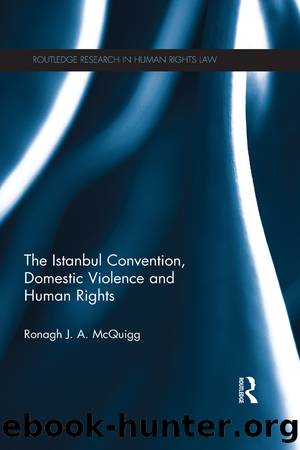The Istanbul Convention, Domestic Violence and Human Rights by McQuigg Ronagh;

Author:McQuigg, Ronagh;
Language: eng
Format: epub
Publisher: Taylor & Francis Group
Civil law measures
As Connelly and Cavanagh comment, âEngaging with the civil law enables women to actively respond to current abuse and seek to stop future abuse without reliance on the criminal law and its agents.â126 The importance of civil law measures is recognised by the Istanbul Convention. Under Article 29, states parties must take measures to provide victims with adequate civil remedies, both against perpetrators and against state authorities that have failed to take appropriate preventive or protective measures. Article 53(1) states: âParties shall take the necessary legislative or other measures to ensure that appropriate restraining or protection orders are available to victims of all forms of violence covered by the scope of this Convention.â Under Article 53(2), such orders must be available for immediate protection and without undue financial or administrative burdens being placed on the victim; issued for a specified period or until modified or discharged; where necessary, issued on an ex parte basis which has immediate effect; available irrespective of, or in addition to, other legal proceedings; and allowed to be introduced in subsequent legal proceedings. Article 53(3) places an obligation on states parties to take measures to ensure that breaches of restraining or protection orders are subject to âeffective, proportionate and dissuasive criminal or other legal sanctionsâ.
The need for adequate civil law measures has also been recognised by the UN human rights bodies. For example, in its General Recommendation No. 19, the CEDAW Committee stated that â[e]ffective legal measures, including .â.â. civil remediesâ127 were necessary to protect women from violence occurring in the private sphere. Likewise, the report of the Special Rapporteur on violence against women containing the framework for model legislation on domestic violence, went into a substantial amount of detail regarding the restraining orders and protection orders that states should make available.128 According to this report, such orders should have the capacity inter alia to compel the offender to vacate the family home, regulate the offenderâs access to dependent children, restrain the offender from contacting the victim and compel the offender to pay the victimâs medical bills.129 Likewise, Article 7(c) of the Convention of Belém do Pará encompasses the placing of an obligation on states parties to âinclude in their domestic legislation .â.â. civil .â.â. provisions that may be needed to prevent, punish and eradicate violence against womenâ.
Article 31 of the Istanbul Convention addresses the area of custody and visitation rights, an issue that is of particular relevance to domestic violence. This provision states: âParties shall take the necessary legislative or other measures to ensure that, in the determination of custody and visitation rights of children, incidents of violence covered by the scope of this Convention are taken into account.â130 In addition: âParties shall take the necessary legislative or other measures to ensure that the exercise of any visitation or custody rights does not jeopardize the rights and safety of the victim or children.â131 Article 45(2) allows for the âwithdrawal of parental rights, if the best interests of the child, which may include the safety of the victim, cannot be guaranteed in any other wayâ.
Download
This site does not store any files on its server. We only index and link to content provided by other sites. Please contact the content providers to delete copyright contents if any and email us, we'll remove relevant links or contents immediately.
Killers of the Flower Moon by David Grann(3228)
Machine Learning at Scale with H2O by Gregory Keys | David Whiting(2267)
Will by Will Smith(2033)
Guns, Germs and Steel by Diamond Jared(1876)
Borders by unknow(1780)
The Room Where It Happened by John Bolton;(1717)
The Color of Law by Richard Rothstein(1574)
Once Upon a Broken Heart by Stephanie Garber(1472)
Water Rights and the Environment in the United States by John Burch(1414)
Examples & Explanations: Administrative Law by William F. Funk & Richard H. Seamon(1324)
Friends, Lovers, and the Big Terrible Thing by Matthew Perry(1324)
A Short History of War by Jeremy Black(1295)
Pharmacy Practice and The Law by Richard Abood(1252)
HBR's 10 Must Reads 2022 by Harvard Business Review(1251)
That Every Man Be Armed by Stephen P. Halbrook(1236)
The Strength In Our Scars by Bianca Sparacino(1234)
The Guarded Gate by Daniel Okrent(1219)
515945210 by Unknown(1205)
Injustices by Ian Millhiser(1197)
